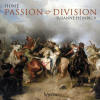Texte paru dans: / Appeared in:
*
GRAMOPHONE (05/2010)
Pour s'abonner /
Subscription information
Hyperion
CDA67811

Code-barres / Barcode:
0034571178110
Consultez toutes les évaluations
recensées pour ce cd ~~~~ Reach all the evaluations located for this CD
Reviewer: Julie
Anne Sadie
Heinrich brings poetry and personality to Hume’s deeply evocative utterances
If you enjoyed Susanne Heinrich’s solo Abel album (1/08), you’ll want this release. Hume’s music stands at the opposite end of the period in which solo viol playing flourished in England but offers a comparable level of technical and musical challenge to the performer. Heinrich raises the stakes by using gut strings without silver or copper winding in the lower register (metalwound strings post-date Hume) — something many players today would find too risky because they speak grudgingly and produce a slightly gruffer sound than wound strings. The rewards for doing so justify the perils: the lowest notes of bass-lines breathe uncannily and blend seamlessly in chords.
This is not the first time a performer has devoted a disc to "Captain Humes Musicall Humors" — Jordi Savall recorded selections in 2004 and several others, Sarah Cunningham (1992) and Vittorio Ghielmi (2004) among them, have included pieces by Hume in albums of English music; Heinrich herself contributed some to Charivari Agreable’s "Queen’s Goodnight" (2002) — but this one offers listeners selections not previously recorded.
Ah, but the music! The melancholy of the opening and closing tracks is bewitching. Here, and elsewhere on the disc, Heinrich dramatically — often poetically — conveys Hume’s deeply personal, seemingly reflective musical utterances. If little is known of his life, the fact that he shared a patron with Shakespeare (the Earl of Pembroke) is enough to realise that in his day his music was taken seriously. Heinrich includes mercurial, conversational pieces that tease the listener (tr 2, 4 and 15) and those that evoke the lute (in "Harke, harke" Hume sought to surpass it with col legno effects). Elsewhere she brilliantly captures his military swagger and bravura (tr 8 and 17), evoking trumpets and drums and a sense of marching into the distance. Bravo!
Cliquez l'un ou l'autre
bouton pour découvrir bien d'autres critiques de CD
Click either button for many other reviews


